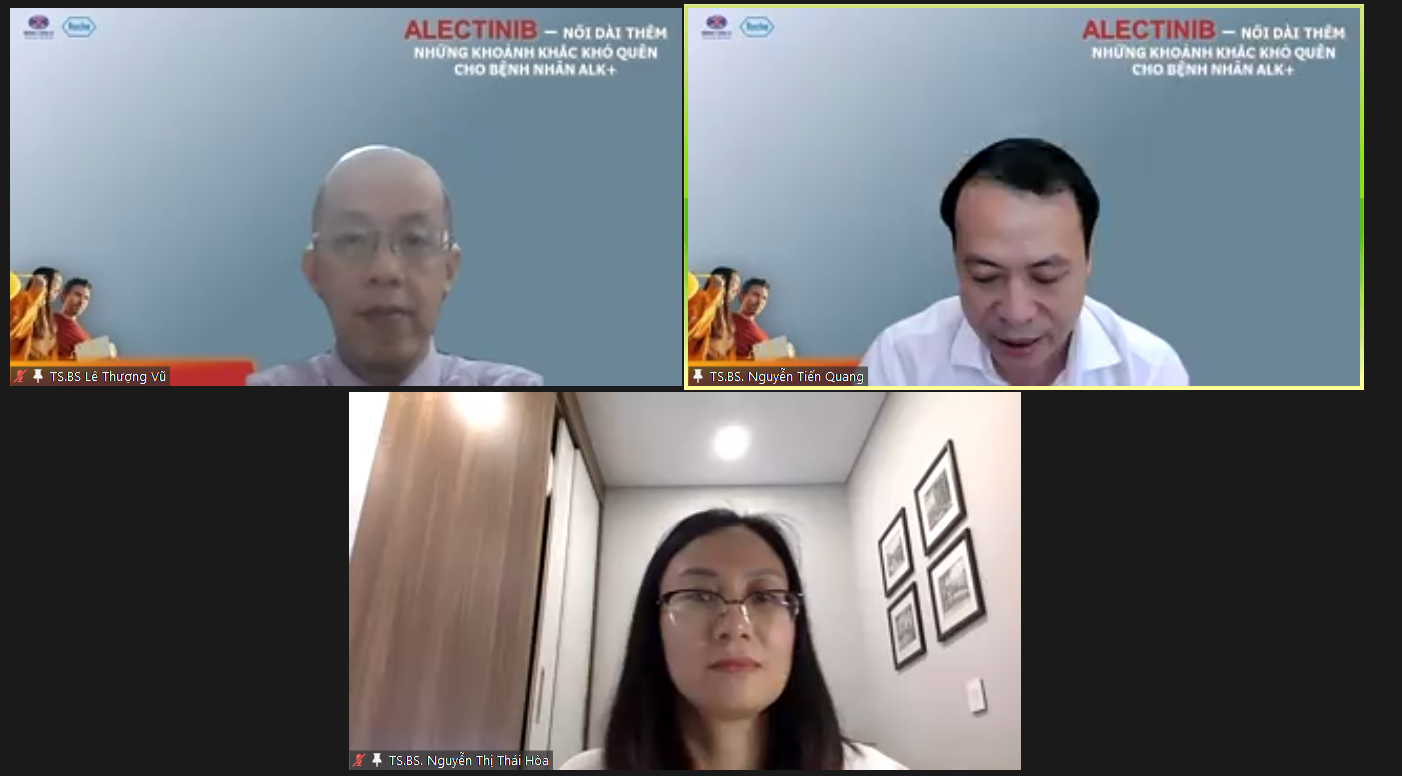Innovative treatment for non-small cell lung cancer patients with ALK+
 |
| Leading respiratory and oncology experts discussed advances in the treatments of non-small cell lung cancer patients with ALK+ at a scientific conference on August 28 |
The event was held by the National Cancer Institute and Roche Pharma (Vietnam) with the topic "Alectinib – more unforgettable moments for your ALK+ NSCLC patients".
Currently, cancer treatment in general is a combination of many methods: surgery, chemotherapy, radiotherapy, medicine, palliative care, nutrition, and psychosocial treatment, among others. In recent years, great advances have been made to create new methods, techniques, and medicines in cancer treatment. Vietnam has been updating these advances rapidly. In the past, it took many years for new methods and medicines to reach Vietnamese patients but now, this gap has been shortened.
Dr. Nguyen Thi Thai Hoa, head of the Internal Medicine Department 2, K Hospital said, “According to the practical treatment around the world as well as research results, Alectinib has significantly extended the lives of lung cancer patients, kept their disease from getting worse for a longer period than Crizotinib and also showed a drastic reduction in the risk of brain metastasis."
Accordingly, 62.5 per cent of patients treated with Alectinib could extend their life by over five years, including three years without severe progression, which immensely improved the quality of life for them. The new treatment using Alectinib, which has been approved by the Ministry of Health, will help improve the efficiency of treatment and extend the life of patients with NSCLC ALK+.
According to Dr. Le Thuong Vu, deputy head of the Respiratory Department of Cho Ray Hospital, practical treatment in the world showed that Alectinib is the preferred choice in the first-line treatment for patients in the advanced stage of NSCLC ALK+. The use of Alectinib in treatment will give better tolerability while reducing the side effects and toxicity, helping to improve the quality of life for the patients.
Girish Mulye, general director of Roche Pharma Vietnam said, “Lung cancer and aggressive diseases in general is an area that Roche has focused on researching for many years to help patients have a longer and better life. We are delighted to offer an innovative treatment that helps lung cancer patients to live longer and share more meaningful moments with their loved ones.”
The International Agency for Research on Cancer (IARC), an agency of the World Health Organization (WHO) has released the cancer report of 185 countries and territories in 2020. This report is updated every two years. In 2020, Vietnam ranked 91st out of 185 countries in terms of the incidence rate and 50th in terms of death rate per 100,000 people. Lung cancer is one of the most common types of cancer in both men and women. In 2020, Vietnam has recorded 26,262 new cases of lung cancer and 23,797 deaths, as reported by Globocan.
Lung cancer currently accounts for about a third of cancer deaths and is the main cause of cancer-related death in both men and women. The new cases of NSCLC in patients who have never smoked or have a minimal smoking history are increasing. About 70 per cent of patients with NSCLC have never smoked. In addition, the patients’ age is quite young, about 50 per cent are under 50 years old. On a global scale, the total number of new NSCLC cases with ALK+ is about 89,000.
It is worth noticing that 89 per cent of NSCLC with ALK+ after diagnosis have already entered stage IV with a high rate of brain metastasis. This will reduce both quality of life and the survival time of the patients. Without effective treatment, the patients only have 6-20 months to live.
| ● Alectinib is a cancer oral treatment for people with NSCLC that have ALK+ tumors. NSCLC ALK+ is more common in young people with a history of light smoking or who have never smoked. ● Alectinib is currently approved in the United States, Europe, Kuwait, Israel, Hong Kong, Canada, South Korea, Switzerland, India, Australia, Singapore, Taiwan, Liechtenstein, Thailand, the United Arab Emirates, Saudi Arabia, Argentina, and Turkey for the treatment of advanced NSCLC ALK+ patients whose conditions have subsequently worsened or who cannot tolerate the treatment with Crizotinib. |
What the stars mean:
★ Poor ★ ★ Promising ★★★ Good ★★★★ Very good ★★★★★ Exceptional
 Tag:
Tag:
Themes: Healthcare Platform
- PM outlines new tasks for healthcare sector
- Opella and Long Chau join forces to enhance digestive and bone health
- Hanoi intensifies airport monitoring amid Nipah disease risks
- Cosmetics rules set for overhaul under draft decree
- Policy obstacles being addressed in drug licensing and renewal
Related Contents
Latest News
More News
- Agro-forestry and fisheries exports jump nearly 30 per cent in January (February 09, 2026 | 17:45)
- Canada trade minister to visit Vietnam and Singapore (February 09, 2026 | 17:37)
- New tax incentives to benefit startups and SMEs (February 09, 2026 | 17:27)
- Vietnam forest protection initiative launched (February 07, 2026 | 09:00)
- China buys $1.5bn of Vietnam farm produce in early 2026 (February 06, 2026 | 20:00)
- Vietnam-South Africa strategic partnership boosts business links (February 06, 2026 | 13:28)
- Mondelez Kinh Do renews the spirit of togetherness (February 06, 2026 | 09:35)
- Seafood exports rise in January (February 05, 2026 | 17:31)
- Accelerating digitalisation of air traffic services in Vietnam (February 05, 2026 | 17:30)
- Ekko raises $4.2 million to improve employee retention and financial wellbeing (February 05, 2026 | 17:28)
























 Mobile Version
Mobile Version